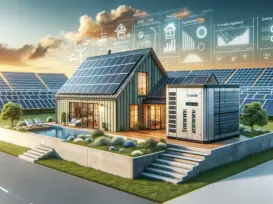Grus Home Energy - Energy Conservation
Unlocking the Power of Energy Conservation: Essential Tactics for a Sustainable Future
Unlocking the Power of Energy Conservation: Essential Tactics for a Sustainable Future
Energy conservation is a critical component in our quest for sustainability and environmental protection. It involves the strategic use of energy to minimize waste and reduce the overall consumption of energy resources. By conserving energy, we can not only save money but also help to mitigate the impact of climate change by reducing greenhouse gas emissions.
One of the most effective tactics for energy conservation is improving energy efficiency. This means using technology and products that require less energy to perform the same function. For instance, replacing incandescent light bulbs with LED bulbs can significantly reduce energy consumption, as LEDs use about 75% less energy and last 25 times longer. Similarly, high-efficiency appliances can drastically cut down on the amount of electricity or gas needed for tasks like washing clothes or heating water.
Another essential strategy is behavioral change. Simple actions such as turning off lights when leaving a room, unplugging electronics when not in use, and setting thermostats to an eco-friendly temperature can make a substantial difference. These actions, although minor when viewed in isolation, can collectively lead to significant energy reductions when adopted on a wider scale.
Building design and construction also play a pivotal role in energy conservation. Incorporating passive solar design, effective insulation, and energy-efficient windows can greatly reduce the need for artificial heating and cooling. This not only conserves energy but also ensures a more comfortable living environment. For existing buildings, retrofitting them with better insulation and energy-efficient systems is a way to conserve energy without the need for complete reconstruction.
Transportation is another major area where energy conservation can have a huge impact. Opting for public transportation, carpooling, cycling, and walking are all ways to reduce fuel consumption. For those who drive, maintaining a steady speed, using cruise control on highways, and keeping tires properly inflated can improve fuel efficiency. Additionally, the shift towards electric vehicles (EVs) is a game-changer, as EVs are far more efficient than conventional internal combustion engine vehicles.
On a larger scale, governments and industries can contribute to energy conservation through policies and practices that promote sustainable energy use. Incentives for renewable energy installations, such as solar or wind power systems, encourage individuals and businesses to switch to cleaner energy sources. Energy audits and management practices can also help industries identify areas where energy can be conserved and implement measures to reduce wastage.
Renewable energy plays a crucial role in the energy conservation narrative. By harnessing the power of the sun, wind, and water, we can reduce our dependence on fossil fuels which are finite and polluting. Investing in renewable energy infrastructure not only conserves nonrenewable resources but also ensures a more stable and sustainable energy supply for the future.
In conclusion, energy conservation is a multifaceted approach that requires collective effort from individuals, businesses, and governments. Whether through technology upgrades, behavioral changes, or policy initiatives, every action toward conserving energy can help pave the way towards a more sustainable and environmentally friendly future. As we become more conscious of our energy use and its impact on the planet, we unlock the power to create a better world for generations to come.
©2025 All Rights Reserved. Grus IoT Co.,Ltd.
